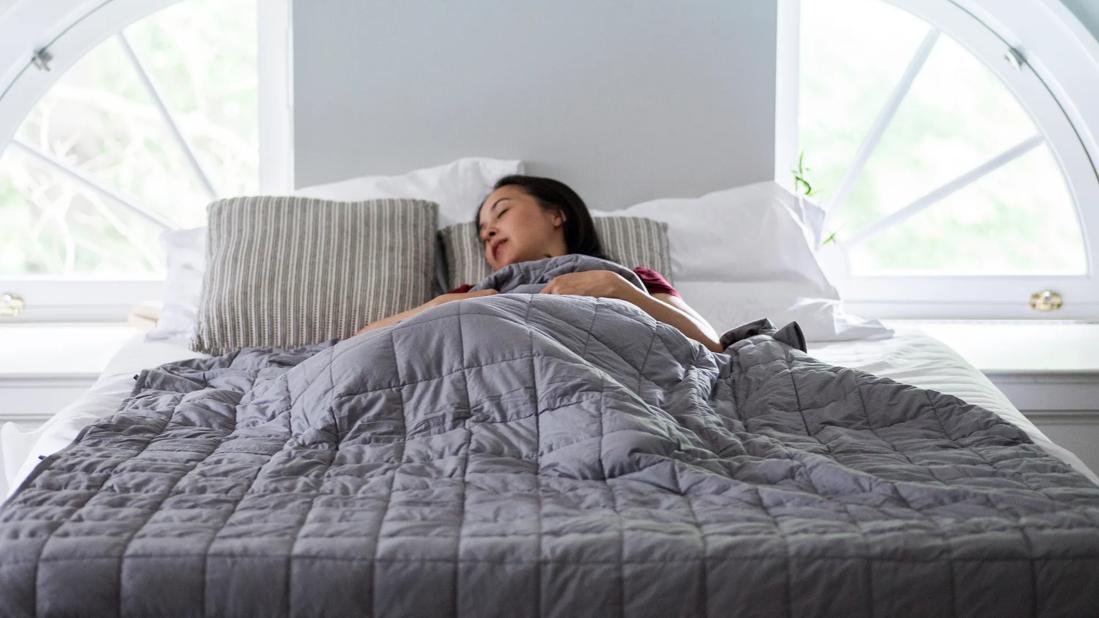Do Weighted Blankets Actually Work?
Limited research suggests a weighted blanket may help with anxiety, insomnia and other conditions

Search online and you’ll find dozens of weighted blankets for sale. But studies of their effectiveness are harder to come by.
Do weighted blankets help you fall asleep and stay that way? Maybe. Maybe not.
We talked with sleep medicine psychologist Alicia Roth, PhD, about the potential benefits.
What are weighted blankets?
Weighted blankets are filled with plastic pellets or glass beads that make them heavy — imagine the lead vest you wear during dental X-rays, on a bed-sized scale. They range from about 5 to 35 pounds, and devotees say they can ease anxiety and help you get a good night’s sleep.
Potential benefits of weighted blankets
The reason weighted blankets may work is based on the calming effect of deep pressure stimulation. Things like a tight hug or swaddling a baby are examples of deep pressure stimulation. And weighted blankets may have similar comforting effects.
Dr. Roth points out that health professionals like occupational therapists use deep pressure touch to help calm children with autism spectrum disorder (ASD).
But do those methods translate directly into a benefit for sleeping under a weighted blanket?
Possibly. But the science as it stands isn’t solid enough to draw surefire conclusions.
“The current studies on weighted blankets are small and have some limitations,” Dr. Roth acknowledges. “So, we can’t definitively say that weighted blankets make a big difference.”
On the other hand, there isn’t any evidence against weighted blankets either. And plenty of people swear by them. “Anecdotally, people do say they’re helpful,” she adds.
What are the potential benefits of weighted blankets? Dr. Roth shares some insight.
Relieve anxiety
Though more research is needed, some studies have associated using a weighted blanket with reduced anxiety.
“Some people go to bed prepared to do battle,” Dr. Roth illustrates. “The moment they switch off the light, their brain switches on.”
If that sounds like you, a weighted blanket may help. But it shouldn’t be your frontline solution for dealing with nighttime anxiety.
Helping insomnia
Weighted blankets are often marketed as a solution to insomnia. So, if you regularly struggle to sleep, you may be tempted to try it.
The research there is sparse. But one study looked at 120 adults with clinical insomnia and at least one other neurological and mental health condition (like depression or ADHD). The researchers found that people using weighted blankets reported improvements in their sleep.
Another study of 102 adults with insomnia showed that those who used a weighted blanket had significant improvements in their sleep quality.
It’s a promising start. But more research is needed to confirm the results.
Managing autism-related sleep concerns
As weighted blankets are based on deep pressure touch, which is a common strategy for managing autism, it stands to reason that weighted blankets would be a benefit for autistic people.
But research on that hasn’t been definitive.
In 2020, the American Academy of Neurology published guidelines for addressing sleep problems in children and teens with autism. They stated, in part, that they found “no evidence that routine use of weighted blankets or specialized mattress technologies improve sleep.” The authors went on to say that weighted blankets also haven’t been reported to be dangerous and that they may be a reasonable strategy for helping autistic kids sleep better.
In other words, they might help, or they might not. But they could be worth a try.
Lessen anxiety around medical procedures
Researchers are also testing weighted blankets as a tool for managing stress and anxiety in clinical settings.
One study suggests weighted blankets may be an alternative to using physical restraints for children during dental procedures. Other research shows that using weighted blankets can be comforting to people who are undergoing cancer infusion treatments.
Weighted blankets: Yay or nay?
Weighted blankets come at all different price points, ranging from the neighborhood of $30 to several hundred. If you’re willing to shell out for one, it’s possible it could help. Look for one that’s no more than 10% of your body weight to keep it from being too heavy.
But don’t expect miracles. Good sleep habits still matter, like:
- Keeping bedtime screen-free
- Following a soothing bedtime routine
- Keeping a consistent sleep and wake schedule
Sleep is important for your physical and mental well-being. So, if it isn’t coming to you naturally, it’s worth getting to the bottom of it. But don’t expect a weighted blanket to be the cure. Talk with a healthcare provider about other ways to address sleep disturbances and get the rest you need.